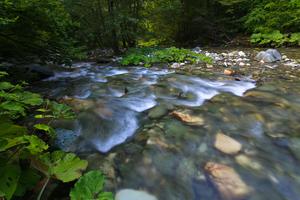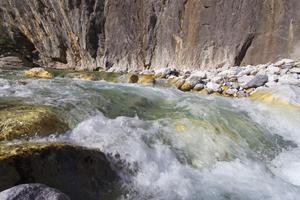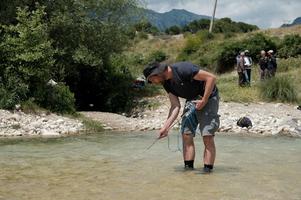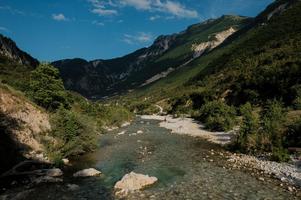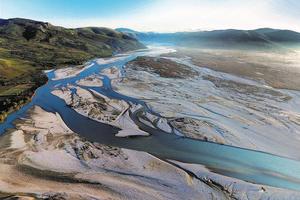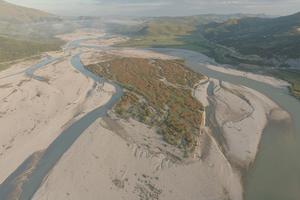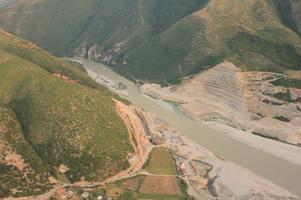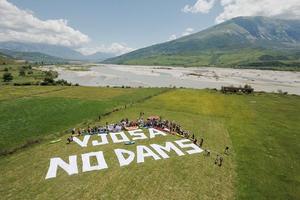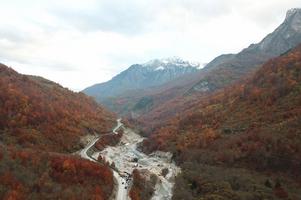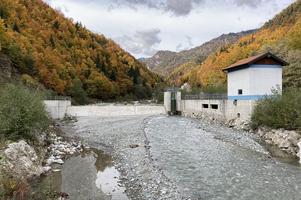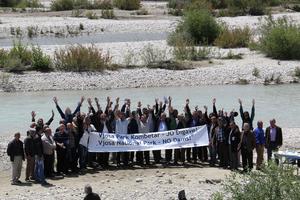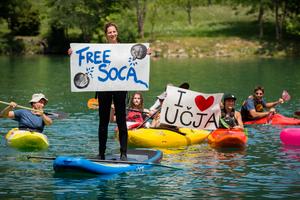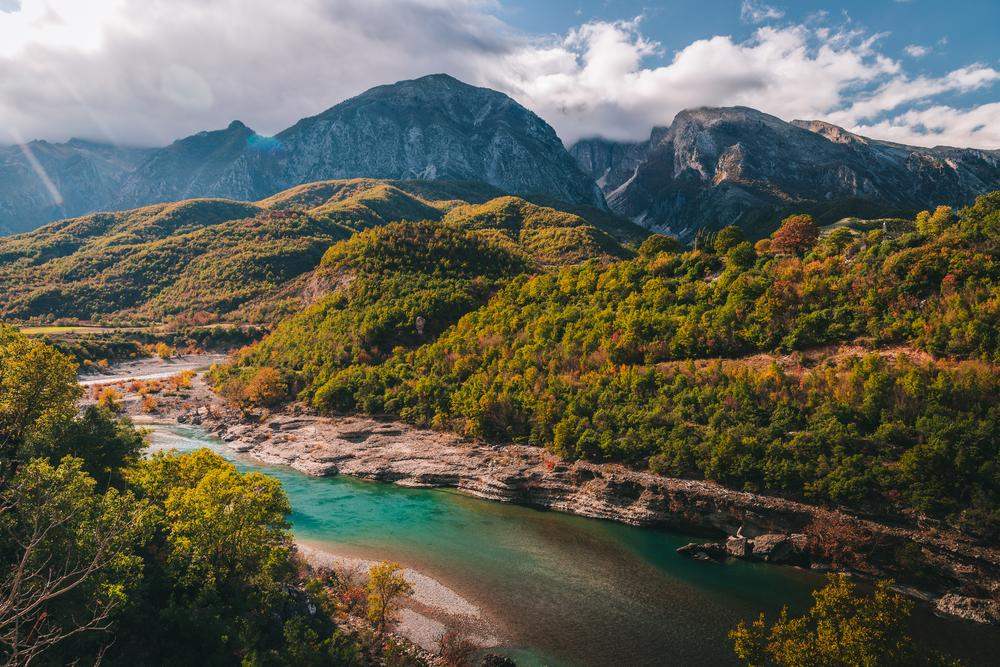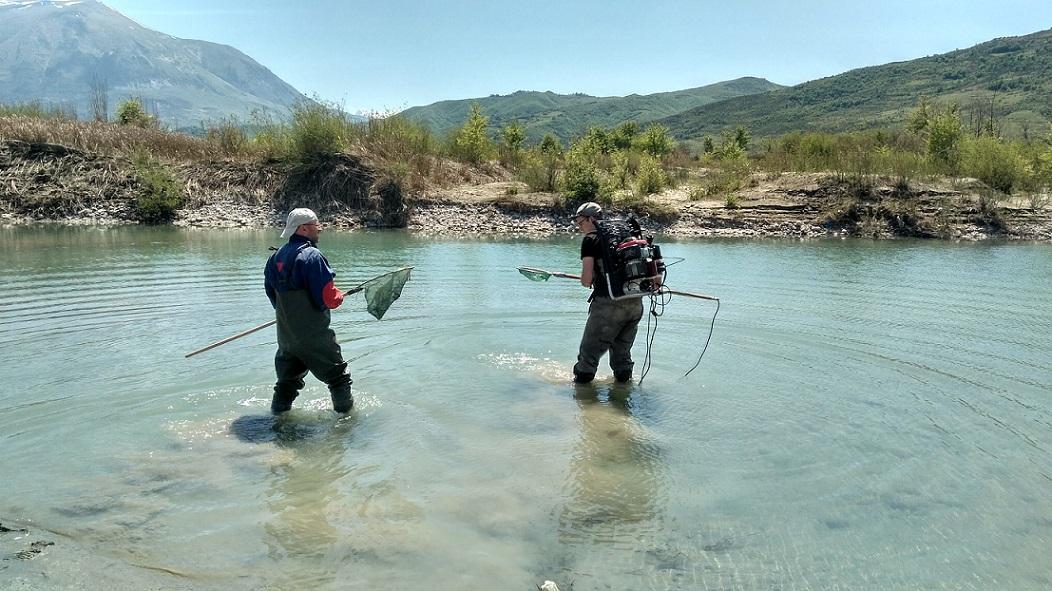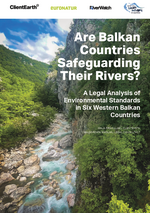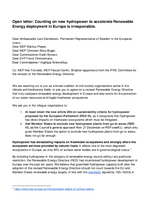Saving the Balkan rivers
In the Balkans, many rivers remain unspoilt. This is where the “Blue Heart of Europe” beats. More than 80% of southeastern Europe’s rivers are in good or even very good ecological condition. By comparison, only 10% of rivers in Germany are considered near-natural and 60% are heavily regulated.
Many rare species live in the rivers of the Balkans, as yet largely undisturbed. Yet the “Blue Heart” is under threat; almost all the Balkan rivers are scheduled to be developed for hydropower utilisation - without any regard for their ecological value. There are even plans for dams in high priority conservation areas.
What EuroNatur and its partners are doing to protect the Balkan rivers and what we have been able to achieve together:
- The Vjosa designated a National Park: For more than ten years, EuroNatur and its partners fought hard for this achievement and, on 15 March 2023, we were finally able to celebrate: the Vjosa - one of Europe’s last great wild rivers - was declared a national park. Since then, some of the Vjosa's unspoilt tributaries have also enjoyed a strict protection status. This represents a huge success for nature as well as for the people who live along the river. Increasing ecotourism offers them good economic prospects - unlike the planned huge dams that would have flooded farmers' fields.
- Opposing the hydropower boom: We don’t just oppose hydropower plants; we are also working to identify alternatives that will enable the Balkan states to develop economically without the expansion of hydropower.>We are helping to make Kutë, on the Vjosa, the first energy self-sufficient village in Albania and we have analysed the solar capacity of roof areas in Tirana where there is huge solar energy potential.
- Mobilising people in support of the rivers: We are supporting civilians in the work they do for the rivers and are ensuring they have international support. We have initiated peaceful protest weeks in the Balkans, set up national campaign teams in many states of the Western Balkans, strengthened local opposition and gained support for our campaign from internationally recognised scientists.
Are Balkan Countries Safeguarding Their Rivers? (June 2024)
(7 MB)Details about the "Save the Blue Heart of Europe" campaign can be found on our campaign website balkanrivers.net
Narta Lagoon in the Vjosa Delta: A precious wetland at risk
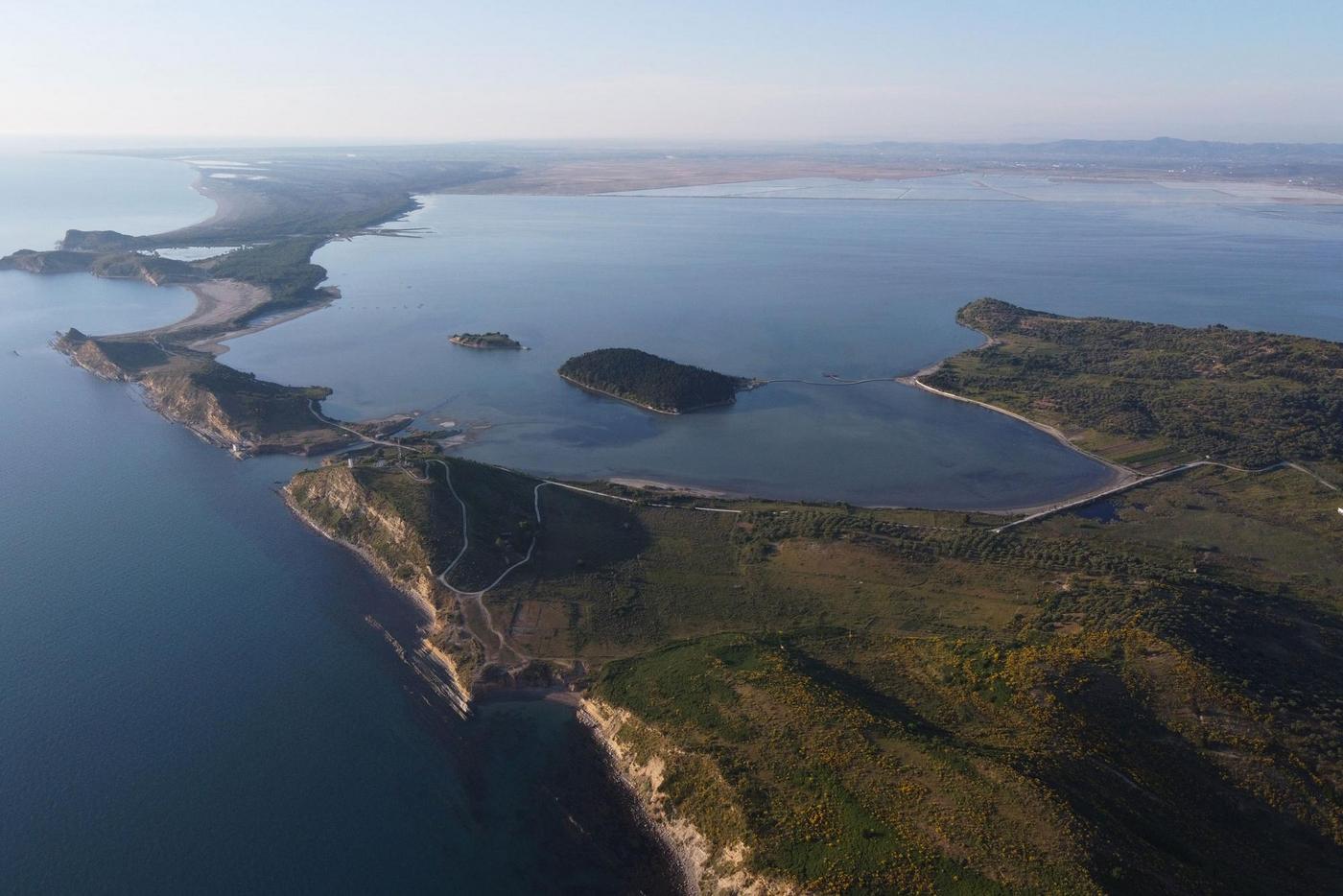
The Narta Lagoon in Albania is one of the most important wetlands on the Adriatic.
© Nick St. OeggerNarta Lagoon in the Vjosa Delta: A biodiversity hotspot
The Narta Lagoon in the Vjosa Delta, a unique and ecologically significant wetland in Albania, holds a prominent place nationally and internationally. Hosting an impressive variety of over 200 wild bird species, this ‘protected’ area is a vital stopover for countless birds during their migratory journeys. Together with the adjacent Divjaka-Karavasta National Park, these wetlands form an uninterrupted ecosystem that serves as a crucial resting and feeding ground for migratory birds traversing the Adriatic Flyway. Simply put, it is a bird’s paradise.
Threats to the Narta Lagoon ecosystem
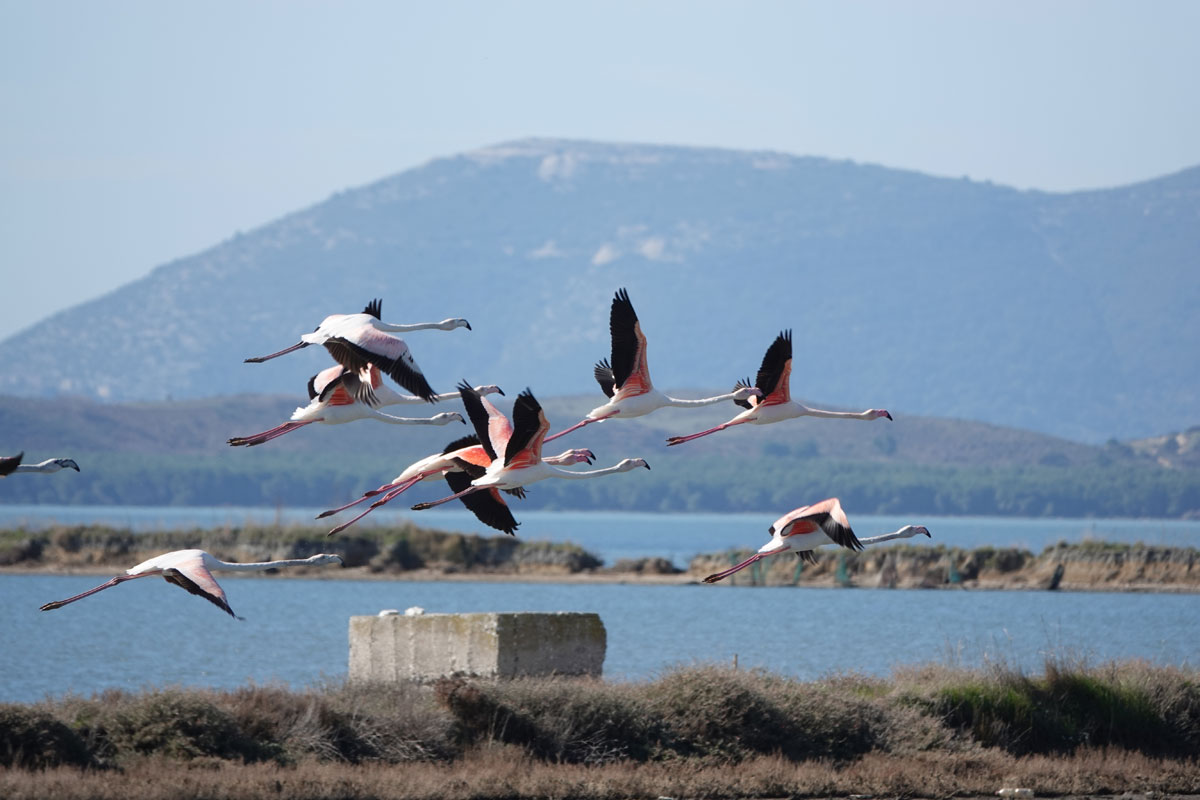
Airplanes instead of flamingos? The future of Narta Lagoon looks bleak.
© PPNEA
The runways of the planned airport can already be identified. Further construction work is progressing unabated.
© Xhemal Xherri / PPNEAThe pristine beauty of the Narta Lagoon in the Vjosa Delta is currently under threat due to the construction of the Vlora International Airport. The Albanian government's decision to construct the airport within this ecologically sensitive area has raised concerns among environmentalists and conservationists.
The proposed airport aims to be one of Albania's largest. Plans include provisions for cargo services and an aircraft maintenance sector. However, this expansion comes at the expense of disrupting the delicate balance of the Narta Lagoon ecosystem.
In disregard for the sanctity of one of Albania's most vital and biodiversity-rich regions, construction work on the Vlora International Airport ploughs forward, defiling this natural haven. This intrusion within the boundaries of the Vjosa-Narta Protected Landscape showcases a disturbing lack of reverence for the environment's delicate equilibrium.
The ongoing construction within this precious habitat constitutes a blatant violation of domestic laws designed to shield such ecological treasures. Moreover, it challenges the sanctity of international conventions, including those that safeguard migratory birds' crucial migratory corridors along the Adriatic flyway.
EuroNatur's Role in Protecting the Narta Lagoon
- Put pressure on the EU: The European Union (EU) Commission has consistently voiced apprehension over the proposed investment within a protected area. Several annual progress reports have documented The EU's concerns, underscoring the significance of preserving ecologically sensitive regions like the Narta Lagoon.

Our national partners in Albania are mobilizing civil society in the fight against the airport, which will hardly bring any economic benefits to the local population.
© PPNEA- Taking a Stand: EuroNatur, alongside other national and international environmental organisations, has been actively working to prevent the construction of the Vlora International Airport within the Narta Lagoon and Vjosa Delta area. Through various campaigns, advocacy efforts, and legal actions, we strive to preserve this vital wetland complex.
- Bern Convention, CMS, and AEWA: In September 2022, the Bern Convention, along with the Convention on the Conservation of Migratory Species of Wild Animals (CMS) and the Agreement on the Conservation of African-Eurasian Migratory Waterbirds (AEWA), conducted an assessment of the area. Following an on-the-spot appraisal, these organisations urged the suspension of construction and a comprehensive assessment of the local flora and fauna.
Stay informed
To stay updated on the latest developments and efforts to protect the Narta Lagoon, follow our social media channels or subscribe to our newsletter. Together, we can ensure the preservation of this natural treasure for generations to come.
Latest news
The Perilous State of Mediterranean Deltas
Deltas, where rivers meet the sea, are intricate landscapes shaped by millennia of natural forces. However, they're not just facing challenges; they're in crisis. A comprehensive study delves into Mediterranean deltas, revealing a story of resilience and the urgent need for conservation.
Mediterranean Deltas
(4 MB)Dam boom in the Mediterranean
In the Mediterranean region, from the Balkan Peninsula to the Iberian Peninsula, the last free-flowing rivers and their respective ecosystems are under threat from both large and small hydropower projects. Hydropower is often portrayed as a "green and clean" energy source. But dams destroy rivers. They impede migratory fish species on their way to their spawning grounds and block the movement of sediments in the river. This can lead to the erosion of entire sections of coastline.
Free flowing rivers are therefore essential for people, for animals and plants, and for sustainable development. EuroNatur is a member of the Anti-Hydropower Platform. The aim of this civil society movement is to protect rivers, from Portugal to Turkey, from the impact of dams and hydropower plants.
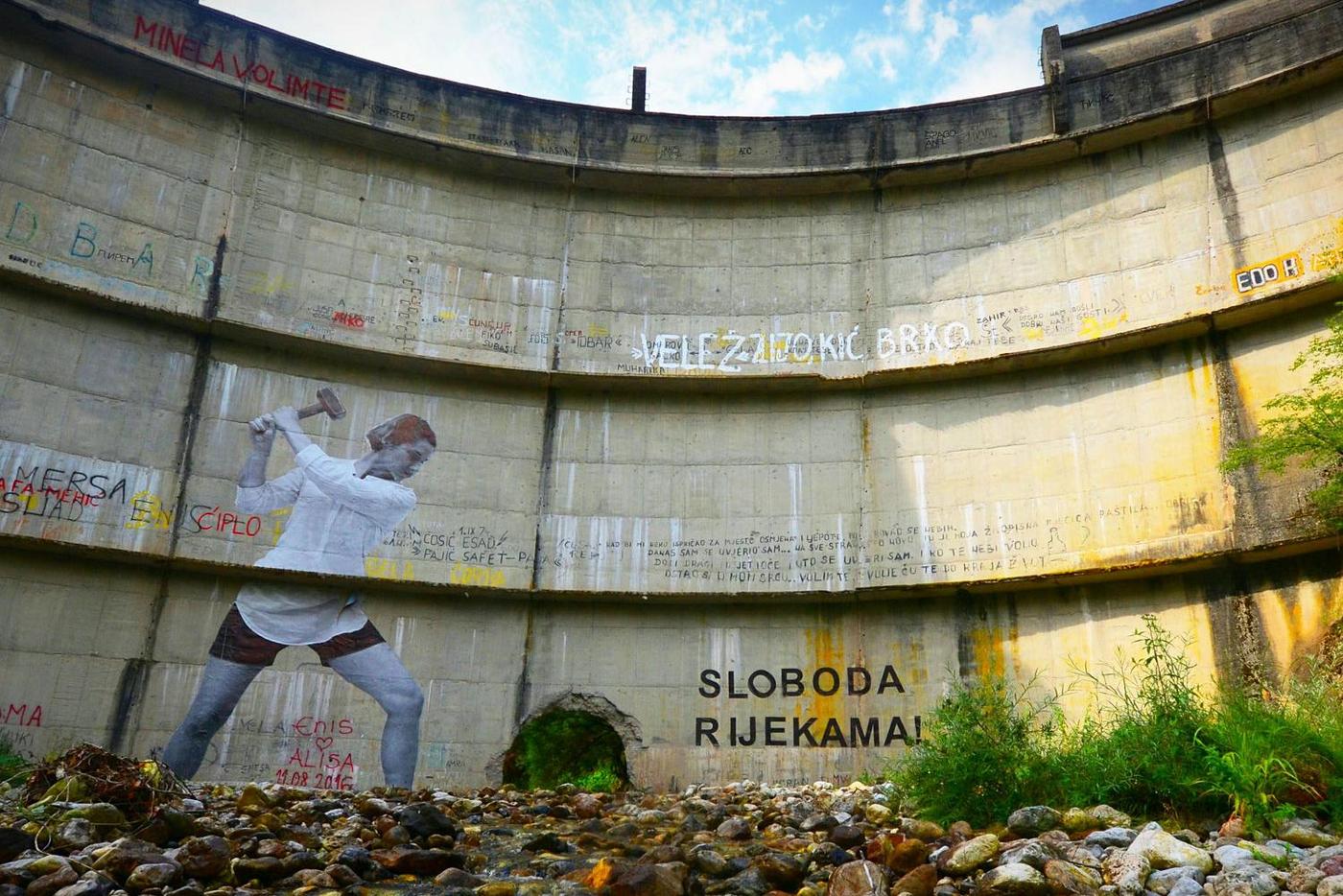
Throughout the Mediterranean, resistance to river engineering is growing: Sloboda Rijekama - Freedom for the Rivers!
© Dinno Kasalo/CZZSWhat EuroNatur and its partners are doing to save Mediterranean river landscapes and what we have been able to achieve together:
- Taking legal action: With a powerful team of national and international legal experts, our partners are taking action against selected hydropower projects. Our strategy has been a successful one; many hydropower plants planned for particularly sensitive stretches of river have not been built or have had a moratorium imposed on their construction.
- Establishing the facts: We are commissioning studies to increase knowledge of the threats posed by hydropower in the Mediterranean. We have thus developed a very good information and evidence base and, as a result, have been able to arm ourselves with compelling arguments to demonstrate why the massive expansion of hydropower is harmful to river character.
- Lobbying: At a variety of political levels, we are arguing against the further subsidisation of hydropower. And, thanks to our persuasive efforts, several countries (Portugal, Montenegro and Bosnia and Herzegovina) have stopped financing dams.
Open letter: Counting on new hydropower to accelerate Renewable Energy deployment in Europe is irresponsible.
(837 KB)On a wave of resistance - Rivers in BiH_Magazine 4/21
(912 KB)Partners: Riverwatch, Front 21/42, EkoSvest, CZZS: Center for Environment, EcoAlbania, Foundation Atelier for Community Transformation - ACT, Tour du Valat, Medina, Pindos Perivallontiki, IUCN ECARO, Wetlands International Europe, WWF Adria, GEOTA
Promotion: Mava Foundation, Manfred-Hermsen-Stiftung, Fondation Genevoise de Bienfaisance, Fondation pour la Sauvegarde de la Nature, Patagonia, EuroNatur donors.
Other EuroNatur river projects
- Preserving Europe’s Water Framework Directive: In 2019, more than 375,000 people responded to the call by numerous nature conservation and environmental protection organisations, among them EuroNatur, to demand that the European Commission retain the EU Water Framework Directive (WFD). With success - the WFD for the protection of rivers will remain!
- Protecting “Europe’s Amazon”: An extensive, largely unspoilt river system stretches out between Austria and Serbia in an area known as the Danube-Drava-Mura Region. Since 1990, EuroNatur has been campaigning, along with numerous partners, for it to be granted protected status. This finally happened in the summer of 2021, when the last section - in Austria - was designated a biosphere reserve by UNESCO.
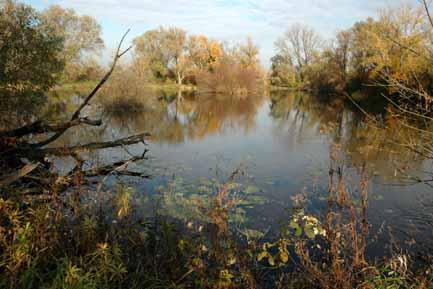
Autumn mood in the Sava floodplains
© Davorka Kitonic- Saving the Sava: Since its foundation, EuroNatur has been actively involved on the Sava River. We have saved the Danube’s largest tributary from countless construction projects so that, as far as possible, it has been able to retain its character as a river rather than just a waterway. Along the Sava, we are networking partners from four countries (Sava Parks Network) and improving the management of invasive species (Sava TIES) in the river catchment.
Partners: Public Institution Ljubljansko barje Nature Park (SL); Lonjsko Polje Nature Park Public Institution (HR); Public Institution Green Ring (HR); Public Company National Park "Una" LLC Bihać (BA); Centre for Environment (BA); Institute for Nature Conservation of Vojvodina Province (RS); Nature Conservation Movement Sremska Mitrovica (RS); Public Enterprise "Vojvodinašume" (RS)
Join in and help us!
You too can join the large circle of those who are committed to Europe's wild rivers. We are grateful for every donation or active contribution! By doing so, you will support an independent and networked civil society in Europe that is working powerfully to protect our fresh waters. Please use your opportunities to help!



